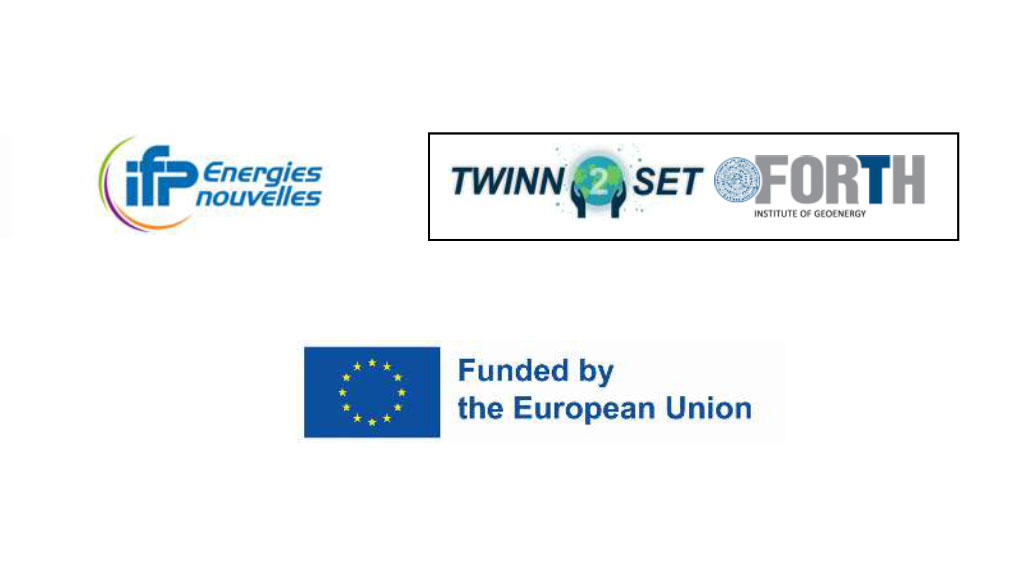Towards a better understanding of subsurface microbial hydrogenotrophic activities using synthetic consortia
Intermittent renewable energies such as wind turbines and solar panels can produce electricity in excess. A promising technical solution to deal with this surplus consists in converting electricity into “green” hydrogen (H2) through electrolysis and to store produced H2 in geological formations. Compared to surface storage, underground hydrogen storage (UHS) in geological formations has numerous benefits: a huge storage space, safety brought by the solid caprock seal, lower cost than large-scale surface tanks, and high availability in existing underground storage sites. Due to its high reactivity and mobility, the major risk associated with UHS is the consumption of H2 by subsurface microorganisms. Hydrogenotrophic populations can use H2 in their metabolism and thus may lead to a variety of undesired side effects such as H2 loss, H2S formation, methane formation, acid formation, clogging and corrosion. H2 reactivity questions the capacity of these systems to keep the quantity and composition of the gas injected during seasonal injection / withdrawal cycles. In this context, this internship focuses the characterization of hydrogenotrophic microbial populations in H2-rich deep environments using cultivation methods. Besides, it will focus on pure cultures and synthetic consortia consisting of methanogenic archaea, sulfate-reducing and homoacetogenic bacteria representative of deep surface environments. Abiotic factors such as salinity, temperature and substrate concentration will be modulated to assess the sensitivity of kinetics parameters. Microbial populations will be monitored using molecular biology techniques (qPCR) and microscopy. These data enable the development of synthetic hydrogenotrophic microbial consortia and numerical simulations to study and model their activity.
This internship is funded by the EU HorizonTWINN2SET project led by FORTH/IG (Chania, Greece).
Keywords: Hydrogen, UHS, anaerobic cultivation, qPCR
|
|
|
|
Location |
IFP Energies nouvelles, Rueil-Malmaison, France |
|
Duration and start date |
6 months, February-July 2024 |
|
Employer |
IFP Energies nouvelles, Rueil-Malmaison, France |
|
Academic requirements |
Bachelor degree in microbiology |
|
Language requirements |
Fluency in French or English |
|
Other requirements |
Knowledge in microbiology, anaerobic cultures |
|
IFPEN supervisor |
Ph.D. POIRIER Simon, Biotechnology department, simon.poirier@ifpen.fr, ORCID: 0000-0003-0669-5117 |
|
FORTH/IG supervisors |
Evina Gontikaki, Institute of Geoenergy, Foundation for Research and Technology – Hellas, egontikaki@ig.forth.gr Manos Stamatakis, Institute of Geoenergy, Foundation for Research and Technology – Hellas, estamatakis@ig.forth.gr
|
About IFP Energies nouvelles
IFP Energies nouvelles is a French public-sector research, innovation and training center. Its mission is to develop efficient, economical, clean and sustainable technologies in the fields of energy, transport and the environment. For more information, see our WEB site.
IFPEN offers a stimulating research environment, with access to first in class laboratory infrastructures and computing facilities.
To apply, please send your cover letter and CV to both IFPEN and FORTH/IG supervisors indicated here above by Friday 10th of November 2023.
The Institute of Geoenergy (FORTH/IG) invites applications for an Early – stage Researcher (ESR) – PhD Student position within the EU funded research project entitled “Twinning to sustainable energy transition”- Acronym: TWINN2SET (GA No 101079246)
The position is a full-time PhD student position and is funded by European Commission, under the under Twinning (HORIZON-WIDERA-2021-ACCESS-03).
The Institute of Geoenergy (FORTH/IG) invites applications for a Post-doctoral Researcher position within the EU funded research project entitled “Twinning to sustainable energy transition”- Acronym: TWINN2SET (GA No 101079246)
The successful applicant will be expected to join a multidisciplinary team of scientists with expertise in engineering, geology, chemistry and biology, and participate in technology transfer events and workshops, contribute to the broad dissemination of science and the project objectives, grant-applications and preparation of research articles.

